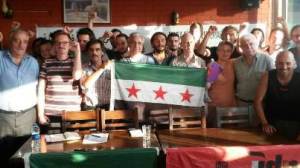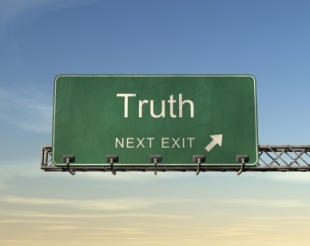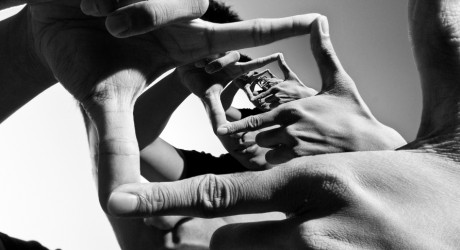
WRITTEN BY Mary Rizzo
Framing the debate is about using the best language to draw others into one’s worldview. It is based on values and influenced by a set of assumptions about how the world is and how it works.
Most of us in the Free Syria campaign identify with progressive and nurturing values and believe in the Enlightenment idea that “the truth will set us free”. We tend to consider humans as basically rational beings. This means that our belief is that when people are presented with the facts, they will reach the right conclusions. But this is sadly NOT the case! We’ve seen this time and time again, as we become stupefied that people have reacted in the ways they have, with indifference, hypocritically, with hostility and with their insistent clinging to the negation of facts, even ones that cannot be denied or covered up.
That is because we haven’t realised that people don’t react to facts, but they only accept them if they already fit into their personal worldview, if they fit into their “frame”. Knowing what a frame is and how to use it to promote the Syrian freedom struggle is important, so we shall begin with explaining how this mechanism functions. All people are born into a world where language already exists and serves to maintain the dominant social order or the community, creating a common identity through its use. Because of how the human brain works, based on language-based thought, people are strongly “identity-based” and use automatically and adopt without critical thought, the framing of what they know or accept (or adopt) as their personal identity, as individuals in a common group. The identity can be based on factors such as nationality, sex, political leaning, religious or ethnic belonging, being part of a majority or minority in one’s own environment and notions of the “moral order”, a sociological concept that comprises a body of unwritten social values and conventions which serve to maintain societal order. The hierarchical moral order of value to society that is the dominant one in the US, God is above man, man above nature, adults above children, Western culture above non-Western culture, America above other nations, men above women, whites above non-whites, Christians above non-Christians, is perceived, even if we don’t personally adopt it, particularly in the light of American foreign policy following 9/11, as being the values of America and its people, also because many do adopt it. In a multipolar world, even wanting to have an alternative framing, the dominant hegemonic one cannot be simply brushed off, and therefore, a very different framing evolved in the various peace movements, and many of us have adopted the alternative framing as our own, despite the fact that it is not the model in force when we were brought into the world. So we know we are able to reframe, but the world remains basically what it is.
Framing, particularly when it comes from a strong identity that is reinforced by the media and entertainment industry, has a preference for certain words. It is simply enough to hear the word so that an entire value system is conjured up in the listener, the value system behind that word, so we should know who developed those words and what their goals are, and if they fit into our value system. Every value system is going to have its own framing and it is going to use it during debate or when making points in discussion.
Here we come to a first principle for effectively framing an argument: DO NOT USE THEIR LANGUAGE. Their words are going to draw you and your audience into their worldview. If you keep the language of the adversary or their framing and just argue against it you do not win because you are merely reinforcing their existing frame.
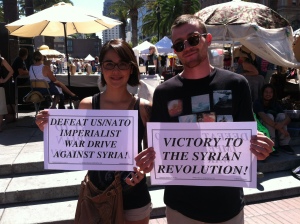
Framing confusion!
So, it’s important to know what the adversary thinks and why they believe what they do. We have to try to predict what they will say, but also to understand the reasons why they hold these values. That means you have to plot people on a spectrum. It’s not a case of “we are good and they are bad”. Aside from a minority of truly convinced supporters of totalitarian societies and leadership, most of our adversaries got their opinions on Syria based on what we can even consider as “shared values”. Indeed, while it feels impossible that those defending the Assad regime’s crimes, its attacks on the civilian population and destruction of the country have any shared values, it is not as absurd as we might think. The denial of the genocide of the Syrian people is something that many who share common values with us buy into. Most of those who are currently our adversaries in Answer and Stop the War, advocating for staying out of the Syrian situation and letting it run its course without “us” made their first forays into protests shoulder to shoulder with us, against the Iraq war, in struggles for the end of the Israeli occupation of Palestine and aggression against southern Lebanon. They were our comrades in leftist, progressive and anti-imperialist groups. Like them, we do not accept unilateralism or the violations of the sovereignty of nations. We too adopt the ideas of self-determination of populations. These are some common values that also contained strong and consolidated linguistic framing and slogans such as “not in my name” and “don’t bomb”. The pro-Assad movements co-opted many of these slogans and framing, but they did not adopt the most important frame and slogan, which is our patrimony and our core value, that of “freedom and dignity of the Syrian people”.
There are other common values that the defenders of the regime attempted to co-opt, and we simply cannot allow them to consider the regime as defending the values such as acceptance of diversity, rejection of sectarianism, the co-existence of diverse ethnic and religious groups in a common form of State, the separation of religious and governmental powers, equality of women and men.
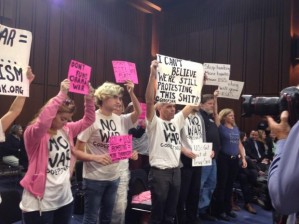 But there are many other values that are common which have slipped away from the framing of those who once were progressives or, are Progressive Except for Syria, but who have now joined the debate in the defence of Assad. Our framing highlights the principle of protection of the people and of the infrastructure. There is also the idea of the lack of legitimacy of Assad. The idea we have of a revolution that demands the fall of the regime predominates, while our adversaries see the concept of Syrian sovereignty, i.e., the maintenance of the current State apparatus, as the core value. They buy into the view of the Syrian revolution as being just one more “colour revolution”, repeating the Russian framing that it is a form of warfare promoted from Washington and has nothing to do with protests against corrupt leadership or the desire to overthrow a totalitarian authority. Naturally, Russia is against all popular uprisings for their own political reasons, and thus, it is natural that the country that had a revolution as its foundational story, but was actually a new tyranny that still exists in different form today, would promote such a line to maintain their own hegemony. It also stood to reason that persons who wear Che Guevara shirts are unable to recognise an actual revolution when it happens because their fetish about revolution was based on State Capitalism and not true Socialism, and they still follow the dogma of the frames provided by those who promote themselves as the true opposition to American unilateralism.
But there are many other values that are common which have slipped away from the framing of those who once were progressives or, are Progressive Except for Syria, but who have now joined the debate in the defence of Assad. Our framing highlights the principle of protection of the people and of the infrastructure. There is also the idea of the lack of legitimacy of Assad. The idea we have of a revolution that demands the fall of the regime predominates, while our adversaries see the concept of Syrian sovereignty, i.e., the maintenance of the current State apparatus, as the core value. They buy into the view of the Syrian revolution as being just one more “colour revolution”, repeating the Russian framing that it is a form of warfare promoted from Washington and has nothing to do with protests against corrupt leadership or the desire to overthrow a totalitarian authority. Naturally, Russia is against all popular uprisings for their own political reasons, and thus, it is natural that the country that had a revolution as its foundational story, but was actually a new tyranny that still exists in different form today, would promote such a line to maintain their own hegemony. It also stood to reason that persons who wear Che Guevara shirts are unable to recognise an actual revolution when it happens because their fetish about revolution was based on State Capitalism and not true Socialism, and they still follow the dogma of the frames provided by those who promote themselves as the true opposition to American unilateralism.
The protesters in the streets who were shot at, thus in one fell swoop taking away any kind of moral legitimacy of Assad as Syria’s president and driving the country into war, with the soldiers who dissented forming the basis of the Free Syrian Army, were not seen as having their own legitimacy or right to self-determination. They view the Syrian revolution from the previous framing that comes from the post 9/11 policy of the USA, where wars in the Middle East derive from the unilateral American imperialist drive to dominate the area and control the resources. They know the USA lied about basic issues in order to pull the USA into wars against Iraq and Afghanistan. They know they depicted Saddam as an evil man and not the President of a country, so he would have to be fought and the population that died would be “collateral damage”, human blood on the hands of the West. The people who accept this framing do not really care about the facts that make Syria a completely different situation with a totally different scenario. They do not recognise that the people themselves in the Arab Spring were the ones demanding the fall of the regime, not “regime change”, a concept that entails foreign meddling for their own national interest. People who denounce UN Vetos when they are used against actions that defend Palestinians are supportive of them and applaud them when Russia and China use them to prevent actions that defend the Syrian people, protecting Assad from inspections about his chemical weapons, which his supporters first denied, but had to backpedal when Assad admitted having them and a deal was worked out to “hand them over” to the Russians. If there is an imperialist orchestration of the war, facts point out that it is Russia at the conductor’s podium. They aren’t interested, obviously, in overthrowing a regime that serves their interests so well and, but they are interested in providing it with arms to keep it firmly in power.
 In every situation involving a conflict, which we can define as a “story”, there is a crime, a victim, a villain and a hero. The legacy of Iraq plays heavily on the perception of these categories. People are not again willing to be fooled again. They don’t want to be dragged into what they call “oil wars”. Therefore, they don’t want to follow the pattern of the past, but can’t forget it, and the supporters of the regime use this framing to win international support. They don’t want to make Assad another Saddam, they don’t believe he is a true villain, but is instead the victim. His use of chemical weapons was ignored also because consensus in the USA will not “fall for” more frames that include WMDs. Slogans like “Bush lied, millions died” are not going to be forgotten easily. Thus, the crime scenario has changed as well. It is seen by these people not as what evidence and facts show, i.e., a crime against civilians where arbitrary arrest and torture and oppression, that were already the reason for the protests in the first place, were brought to an extreme level and done out in the open because they were framed with a scenario of “self-defence”. The victim shifted from being primarily the Syrian people into the Syrian government, busy defending itself in order to protect its people from foreign intervention and terrorism.
In every situation involving a conflict, which we can define as a “story”, there is a crime, a victim, a villain and a hero. The legacy of Iraq plays heavily on the perception of these categories. People are not again willing to be fooled again. They don’t want to be dragged into what they call “oil wars”. Therefore, they don’t want to follow the pattern of the past, but can’t forget it, and the supporters of the regime use this framing to win international support. They don’t want to make Assad another Saddam, they don’t believe he is a true villain, but is instead the victim. His use of chemical weapons was ignored also because consensus in the USA will not “fall for” more frames that include WMDs. Slogans like “Bush lied, millions died” are not going to be forgotten easily. Thus, the crime scenario has changed as well. It is seen by these people not as what evidence and facts show, i.e., a crime against civilians where arbitrary arrest and torture and oppression, that were already the reason for the protests in the first place, were brought to an extreme level and done out in the open because they were framed with a scenario of “self-defence”. The victim shifted from being primarily the Syrian people into the Syrian government, busy defending itself in order to protect its people from foreign intervention and terrorism.
The regime’s justification for openly doing things that international conventions and common ethics do not allow was that they were defending themselves from various nefarious entities. They in fact, didn’t always deny the crimes they were accused of, but downsized them, attempted to put the responsibility for some of them on their opponents and used them in their framing on a continuative basis. The narrative of resistance to the Zionist state was no longer very convincing, as they never lifted a finger to liberate an inch of the occupied Golan, so the villain had to be promoted more fully and was effectively done with those who already have adopted the anti-imperialist narrative and framing. It also roped in the neo-cons and Islamophobes because it claimed that the enemy was more on various fronts, it was the Imperialist West, the Jihadis, Islamic Terrorists, Foreign Agents who trained traitors to overthrow a legitimate government, not respecting the will of the Syrian people to be governed by whoever they wanted, and in this case, by Assad.
Since any narrative functions only when the language can be quickly understood by the listeners, the previous slogans and language of peace movements were used to bolster the power of the regime. Rather than use the language in a reactive way, they used it in an assertive way, with some exceptions such as “Don’t Bomb Syria”. It has worked to depict and sell the war as a heroic struggle of good over evil with Assad and nations outside the unilateral power paradigm fighting those who want to destroy it and make it conform to an evil system. You will see many arguments about it not being in the Rothchilds banking system, about it being part of the Axis of Resistance to Israel, about it being some kind of state with a socialist division of wealth and its refusal to align with Western powers and serve their interests. The regime is depicted as a force against homologation and they are fighting against foreign invasion. The struggle that the regime is fighting is depicted as an existential struggle and he is framed as a good guy… or, if not quite a “good” guy, he’s certainly depicted as the “lesser evil”.
To do this, the regime has to be depicted as “moderate” and opposition to the regime has to be depicted as “extremist”, and the FSA and the many militias that oppose the regime but also oppose the Islamic State and the idea of a Caliphate have been either painted out of the picture, or reframed as belonging to some extremist Jihadi form of warfare that is anti-democratic and against our values that include secularism, pluralism, equality of the sexes, etc. The position and the power of the Islamic State had to be framed as the opposition to the regime, their presence had to be the only one acknowledged, their crimes against minorities had to be highlighted, while the crimes of the regime against the majority had to be ignored for this framing to be complete. The vastness of the regime crimes are nothing, really, if you compare it to what the Islamic State has in store. Thus, if you couldn’t whitewash Assad, you had to at least “admit he was the lesser evil”.
The concept of “lesser evil” should also be rejected as a frame. It somehow seeks to depict all sides as being forces of evil, current or potential, and it allows for the violation of human rights and exceptions to our ethical rules, because there would have to be exceptions made in order for a “greater good”. The violation of basic human rights, arrest of minors, arbitrary arrest of the adult population, disappearances, the suspension of freedom and so forth, have to be tolerated, stretching the moral and ethical standards beyond known acceptable limits. All of these things would never be allowed in democracies such as our own, and if they were, they would be slippery slopes indeed, so people rightfully march in the streets against these violations in their own countries. But when the Syrians marched, their rights did not matter, what mattered was the ideological and dogmatic things activists started to accept as the norm when supporting a “lesser evil” while also believing they were in the right and progressive.
If there are terrorists, it is commonly held that they must be fought and they must not win, by any means necessary, or so goes the narrative. By clumsy or manipulative definition of who the terrorist is, the regime allowed decent human beings to think that it was for a greater good that children and adults are preventively arrested, shot at and their cities even held under siege and arbitrarily bombed, creating what we know of in the West as the “refugee crisis”, but which in fact means that half of the Syrians have been displaced from the country and countless have been killed, arrested and disappeared. The activists in the West who support Assad accept starvation sieges and the suspension of freedom. These people are going to accept forced expulsions and ethnic cleansing of population to be replaced with populations supportive of the regime, because they accept the regime framing of them as “evacuations”: all in the name of their adoption of the “lesser evil” framing, and duly manipulated through the use of the framing they were already using since the Iraq war.
In our framing, rejecting the “lesser evil” framing, we must present the value that any evil is unacceptable. That we operate according to other values and standards and we are not willing to compromise on them. We uphold human life and freedom and we also recognise the manipulative nature of the fallacy of the regime narrative because we witness the effects of his policy. Since he bases his action on a goal of defending his power, but frames it as saving the nation, everything can be sacrifice to preserve the State apparatus as it exists under his control. There never could have been reform, as it would have threatened his power, so the narrative shifted from peaceful protests demanding reform to that of foreign-backed regime change and currently is centred on prevention and defeat of radical Islamic Terrorists.
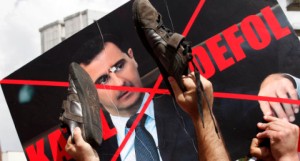
Protesters use their shoes to hit a defaced poster of Syria’s President Bashar Al-Assad during a demonstration to express solidarity with Syria’s anti-government protesters in front of the Syrian embassy in Ankara June 10, 2011. The words on the poster read: “Murderer. Go away”. REUTERS/Umit Bektas (TURKEY – Tags: POLITICS CIVIL UNREST IMAGES OF THE DAY)
The revolution was reframed as external meddling, with a popular framing being that the Islamic forces, (ignoring the fact that they were often actually fighting against the Islamic State) were all terrorists that were “Al Qaeda affiliates” or they were part of the Islamic State. In some cases, the framing was that both Al Qaeda and ISIS were creations of the CIA, so the full spectrum of the opposition was nothing more than a CIA regime change operation. The Syrian regime was thus justified for almost any crime it committed. The systematic and institutionalised security apparatus that had been used to control the population and punish dissent in order to preserve power had been morphed in the framing into being a tool for prevention and containment of Islamic terrorism. In the framing of the anti-imperialists, he became a heroic defender of his country’s autonomy, sovereignty, and a pillar of secularism and pluralism. To those who never harboured much affection for him, the War on Terror narrative meant that he was the lesser evil when put next to Jihadi Terrorism, which basically only becomes problematic to them because it is without distinct boundaries, capable of recruitment, uses unconventional and random attacks more often than war on the battlefield, or it occupies rural areas and roads in faraway places in Africa, the Middle East and Asia but also in the cities of the West such as New York and Paris. Since it can’t be easily contained, but causes fear, it is perceived as a greater threat to the world. New alliances to support this new paradigm have been formed, such as those with Iran and Russia, entering into the framing as actions to “protect the world”.
The principle remains that facts serve the narrative, not the other way around. People will ignore the number of deaths caused by the regime because they feel that its struggle is noble, that it is also THEIR struggle, that he is a lesser evil. The facts that they illustrate are looked at and accepted as long as they fit the pre-existing or predominant frames.
So, how do we overcome this impasse when what is actually an aggressive, destructive, tyrannical force is passed along as the “good guy”? Not by ignoring or abandoning the facts, but by working on our framing. Facts will be ignored, but the frame, if it resonates with the VALUES of the listener, will remain. We have to focus on our shared values, think strategically and with the BIG PICTURE in mind, not moving from crisis to crisis or issue to issue, though at times we need to do that because of the humanitarian emergency that we are dealing with in Syria, and that our adversaries ignore until people land on their shores or cross over their borders.

a Syrian child doing some real-life framing!
Our enemy is war. Or enemy is terrorism. Assad started the war. Assad enabled terrorism and has used it over and over to stay in power. Assad raised the war to atrocity levels also by violating human rights further than what he has done already in “peacetime” but he now does it openly in the fog of war, where people are ready to suspend their ethics and values for a perceived “greater good”. He brought in foreign fighters to carry out his war, from places such as Russia, Iran and Lebanon, with their militias and their commanders leading battles and carpet bombing entire areas. Assad’s enemy is the Syrian people and their tendency to dissent, as a free people will try to do. He is against their dignity and self-determination. He is willing and able to destroy the people, drive them out of their homes and country, all in the name of holding onto power. His army uses the slogan “Assad or we burn the country”, and this is also their military policy. He allowed forces such as ISIS to develop by freeing the most radical elements from his prisons and replacing them with secular dissenters. He has never actually attacked ISIS and in fact, his army fled from cities they controlled, rather than defend them from ISIS, leaving the population at the mercy of the brutal Islamic State militias. He has labelled all those who oppose him as Islamic Jihadi Terrorists, Saudi or American agents, etc. The point is. Be PROACTIVE, NOT REACTIVE. List what Assad has done, talk about how he has taken advantage of the fear and uncertainty that has been a dominant theme of the world since 9/11 to oppress his people further, to consolidate his power and to create a “Coalition of the Killing” to help him carry out his own agenda, which is totally anti-democratic, not at all moderate, but is blood-drenched and destructive for the entire region and beyond. He created the refugee crisis that is affecting Europe, he is laying the basis for imperialist domination of the Levant. He is following the opposite of the principle of non-interference, as his internal calls for reform were met with violence and the nation’s army, rather than defend the country’s assets and people, was asked to wage war against them. Since they were insufficient for such a task of bringing the whole country under his control once the uprising became a revolution, he called for other armies and militias to do his battles, lead his forces and bomb opposition areas.
Keep the framing on a level of values, then substantiate with facts. Recognise that neutral people may actually be using a language and framing that they don’t fully agree with or adhere to, but that is because they are more familiar with it or have heard it more often Since television and the media focus, both mainstream and alternative, focus on ISIS crimes, the public may not actually be aware of the scope of the crimes of the regime and how it created the war in Syria.
In debates, never answer a question framed from your opponent’s point of view. Always reframe the question to fit YOUR values and frames. Stay away from set-ups where you have no control of your own presentation or language and are forced to conform to a frame you know is a lie. If you can’t participate in events due to their nature as set-ups, CREATE your own opportunities, and be aware that the adversary is just waiting for an opportunity to trap you into his frame. Don’t let that opportunity arise.
 Stay with values that you truly hold, be aware of the values that those in the public hold and frame the shared values. Stay on the offensive, not the defensive. You can actually convince people simply by asserting something, bear that in mind. People do not always know enough about something to fact-check it, but if you know your facts, can assert your frame calmly and rationally, it shows that you are knowledgeable, convinced of the reasonableness of your point of view and it then becomes authoritative.
Stay with values that you truly hold, be aware of the values that those in the public hold and frame the shared values. Stay on the offensive, not the defensive. You can actually convince people simply by asserting something, bear that in mind. People do not always know enough about something to fact-check it, but if you know your facts, can assert your frame calmly and rationally, it shows that you are knowledgeable, convinced of the reasonableness of your point of view and it then becomes authoritative.
Reinforce our terminology and framing. We know Assad is not a “President” as the term is understood within a democracy, but instead, he is a “Dictator” and a “Tyrant”, illegitimately holding power by the force of a completely twisted election in which only his supporters were allowed to participate freely. We know his is not a democratic government with a legislative and judiciary branch and a security system that would be tolerated in any normal democracy, but it is a “Regime”. We know he is not a “Moderate”, but an “Extremist” who uses unconventional warfare and has committed crimes against humanity against his people. He routinely uses terrorism. We know he is not “defending” his country, but “attacking” it and has dragged the entire world into his war against the people just to maintain his power, which is also economic. Those countries dragged in are not freedom and sovereignty lovers, but instead are making profits and a killing (literally) through their arms sales and use of their weapons and soldiers. They are interested in their energy deals and the huge reconstruction that they will be paid to do in the post-war period. They have geopolitical designs in the area that go from their own control of a naval base to the re-alignment of the Levant under Iranian/Shi’a predominance. They want to stockpile their arms and forces in the area for expansionist policies.
We will be pulled into issues where we are put on the defensive. A current one is the denial of the starvation policy that the regime uses against opposition-held areas. We are told (in fact) two different narratives, and there are two framings that are used interchangeably. The first is that the “rebels” (which we should call simply “the Opposition”) have kept the food out and that they use the civilians as their hostages and human shields and the second goes that they there is actually no starvation going on, because what we see are pictures from other places and dates that are used in the reports that come out of these places.
We can use and pick apart both of these framing attempts and reframe so as to point out that it is indeed Assad behind the starvation campaign. First of all, we can point out that it is the regime that controls access to the city, which is not a secret to anyone. Nothing goes in or out unless the regime (or its proxy, Hezbollah, in the case of Madaya) lets it. UN and ICRC convoys that officially have delivered the first aid allowed in after six months, as well as independent convoys, all have acknowledged the regime restriction on aid being delivered unless it obtains permission from the regime, which finally gave it after the international outcry. Any other food coming in must be smuggled or bribes paid to the regime soldiers at the roadblocks, which has been how some aid has made it in through even the regime controls. Is it not morally bankrupt for food to have to be smuggled in? Restricting food violates all rules of war and international conventions about those caught in war and how they shall be treated. Secondly, we can point out that people are ethnically cleansed in order that the most ill can be treated and have food, while the word “evacuated” is used. They are not being evacuated from a disaster area, they are being further punished and forced out of their homes as part of a greater plan of ethnic cleansing and replacement of the population with a different one.
Regarding the authenticity of the pictures, reframing here also works to our advantage: we recognise that regular professional journalists are denied entry unless they are embedded by the regime. We also know that independent journalists are killed by the regime and the numbers alone prove that the regime has targeted journalists and hoped it would be a war in the dark, despite the age of internet and cell phones. Individuals who are not journalists smuggle out pictures and videos taken with their phones. Word-of-mouth is used to circulate the pictures and the tam-tam is not always accurate because the profession of journalism has not been allowed to do its work. Citizen journalists may not speak anything but their own language, they do not control the use of their images after they start to circulate and not even taking into account the disinformation campaign the Russians and regime supporters are trained in and practice, it’s not common practice for people to use due diligence and check the photos. And yet, their efforts have been verified by non-political agencies on the ground who have testified that what they had seen when being finally allowed in by the regime were indeed entire areas of forced starvation and siege, the withholding of food and medicine and the survival of the people by resorting to eating grass, leaves and salt. They claim that photos may be from one of the many besieged cities, that it is not just one city, but that this practice is widespread. Covering up crimes and atrocities this outrageous by shifting the focus onto the authenticity of specific pictures when there is ample evidence this is in fact the actual situation is nothing less than genocide denial. We refuse to adopt this as our principle. We do not miss the forest for the trees as the regime defenders do in their pitiful attempts to change the framing into one of “it’s all lies, none of this is true, nothing to look at, move on.”
By predicting what the adversary’s framing is, refusing to use it and thus reinforce it, but using OUR OWN framing in a PROACTIVE way, based on our values, we can draw others into our worldview, which puts the protection of the Syrian people as the priority, as well as the defence of their struggle for freedom, because freedom and justice are our core values, and we will never compromise on these humanitarian and human values.
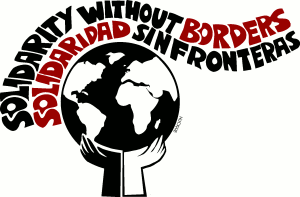 April 2, 2019
April 2, 2019














